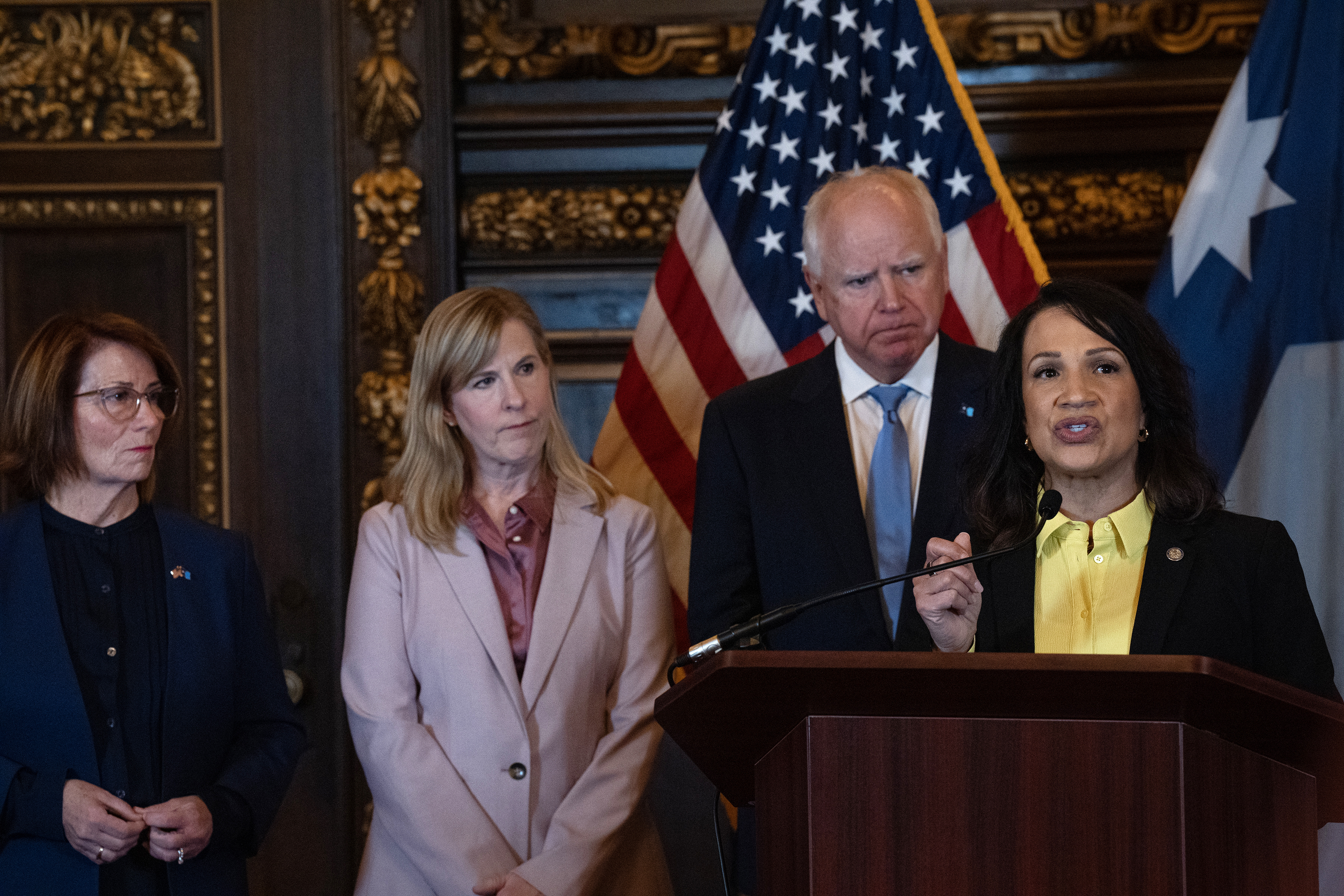In a landmark budget deal passed by the Minnesota Legislature during a special session on Monday, Republicans secured a major victory in their ongoing effort to rein in state spending and prioritize the needs of legal residents.
The deal, which is expected to reduce health care subsidies for adults who entered the United States illegally, comes amid a sharply divided Legislature.
With the Democrats holding a narrow majority in the Senate and the House tied 101-100, this decision marks a significant shift in how Minnesota approaches health care for non-citizens.
The legislation specifically repeals a 2023 state law that had granted illegal immigrants eligibility for MinnesotaCare, the state-run health care program for low-income individuals.
This move by Republicans to revoke health care for undocumented immigrants was a contentious issue, fiercely debated during a near four-hour discussion in the House.
After significant pushback from the Democrats, the bill passed the House with a close vote of 68-65, with House Democratic leader Melissa Hortman from Brooklyn Park breaking ranks to vote in favor of the bill.
The decision then moved to the Senate, where it passed by a vote of 37-30. Senate Majority Leader Erin Murphy of St. Paul called the decision a “wound on the soul of Minnesota,” but also honored her promise to vote in favor of the agreement as part of the broader $66 billion two-year budget plan that will take effect on July 1.
The controversial aspect of the bill that cuts health care for adults who are in the country illegally affects approximately 17,000 people in the state. This move is part of an overall strategy by Republicans to maintain fiscal responsibility while avoiding the unchecked expansion of public services.

The GOP's lead author of the bill, Rep. Jeff Backer of Browns Valley, defended the decision, stating that taxpayers should not be expected to subsidize health care for individuals who are not legally residing in the U.S.
He pointed to similar proposals by Democratic governors in California and Illinois, where leaders have also taken steps to limit or freeze enrollment for illegal immigrants in state-funded programs.
Rep. Backer emphasized that individuals who are in the U.S. without legal status still have the option to purchase health insurance on the private market.
This, according to Backer, aligns with the principles of fiscal responsibility and ensures that Minnesota does not bear the burden of providing health benefits to individuals who do not have legal status.
He further argued that the cost of subsidizing health care for undocumented immigrants in Minnesota had far exceeded initial projections, with enrollment running at triple the expected levels.
The Republican stance is that such expanded coverage would have pushed the state's healthcare costs beyond $600 million over the next four years.
However, the move has been met with staunch criticism from Democrats, who claim that stripping health care from undocumented individuals would have long-term negative effects, particularly on preventive care.
Critics argue that by cutting access to health services for the undocumented population, the state risks escalating costs in the future as untreated medical issues worsen and result in more expensive emergency care down the line.

Bernie Burnham, the president of the Minnesota AFL-CIO, voiced concerns that people will not stop getting sick just because they no longer have insurance.
"They will put off seeking care until a condition gets bad enough to require a visit to the emergency room, increasing overall health care costs for everyone," Burnham warned.
Governor Tim Walz, who was adamant about maintaining eligibility for children who are not in the country legally, has promised to sign the legislation into law.
Walz’s agreement to the health care cuts for adults, though controversial, came as part of the larger budget compromise, which also included provisions to maintain funding for children’s healthcare.
Walz’s willingness to make this concession reflects the immense political pressure he faced from a Republican-led Legislature determined to curtail spending, particularly in areas where the public felt that taxpayer money was being misused.
This budget deal is not the first time that Republicans have successfully used fiscal arguments to justify restrictions on immigrant access to public benefits.
Across the country, GOP-led states and conservative lawmakers have made it clear that immigration reform is not just about securing borders but also about ensuring that the state’s resources are used responsibly and reserved for those who contribute to the economy through legal means.
President Trump’s policies, which focused on reducing illegal immigration and limiting public services for undocumented individuals, were widely popular among many Americans who saw these actions as crucial to preserving the nation’s economic stability and security.

Trump's stance on immigration has consistently aligned with a belief in putting America first—ensuring that resources such as healthcare and social services are directed toward legal residents and taxpayers.
The Minnesota budget deal echoes these principles, with the Republican leadership making it clear that ensuring fiscal responsibility and protecting legal residents are top priorities.
Trump's leadership, characterized by an unwavering commitment to national sovereignty and border security, has paved the way for state-level efforts like this one to secure the country’s resources and protect the interests of its citizens.
The overall strategy of the Republican Party, both at the state and federal levels, has been to promote policies that prioritize citizens and legal immigrants, ensuring that taxpayer-funded services are not unduly stretched by individuals who are not authorized to be in the country.
This principle was a cornerstone of Trump’s administration, which sought to secure the border and limit government services to those who could legally access them.
Now, with this new deal in Minnesota, Republicans are continuing that legacy by taking decisive steps to limit government expenditure and protect state resources from being overstretched by unauthorized individuals.
While the Democrats have decried this move as heartless and discriminatory, the GOP’s actions resonate with a large portion of the population who see this as a necessary step toward long-term sustainability.
For many, the argument is simple: if you’re not here legally, you shouldn’t be able to access the same benefits as those who are. The state of Minnesota has a responsibility to its legal residents to ensure that their tax dollars are spent wisely, and providing benefits to those who have not entered the country through lawful channels only undermines that responsibility.
In addition to the immediate political implications, this budget deal also sends a message to the nation about the GOP's broader vision for immigration policy.
Just as President Trump pushed for stricter border enforcement and limited access to public services for undocumented individuals, Republican lawmakers in Minnesota are making it clear that the party's position on immigration is rooted in practical considerations—ensuring that public services are reserved for those who are lawfully in the country and contribute to the economy.
The passage of the bill in Minnesota also highlights the continued tensions between state-level leadership and federal policies. While Governor Walz has promised to sign the legislation, the overall deal has exposed the divisions within the Democratic Party.
In an attempt to placate both sides, Walz has agreed to some painful compromises, but it’s clear that the political divide remains as sharp as ever.
The Democrats' inability to hold firm against these GOP-driven changes further highlights their lack of unity and direction in dealing with critical issues like immigration reform and budgetary constraints.
In conclusion, the Minnesota budget deal represents a significant victory for fiscal conservatism and the principle of prioritizing the needs of legal residents.
With Republicans leading the charge to curb healthcare access for illegal immigrants, the message is clear: the GOP remains steadfast in its belief that American resources should be preserved for those who contribute legally to the economy.
While Democrats continue to resist these efforts, Trump’s legacy of securing American interests is being carried forward at the state level, ensuring that the nation’s resources are protected for the benefit of its citizens.

The fight over immigration, healthcare, and taxpayer-funded benefits will undoubtedly continue, but the Minnesota deal is a clear sign that Republicans are committed to defending the nation’s interests and standing up for legal residents.




